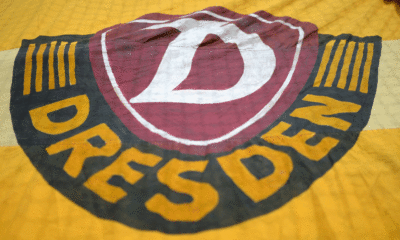Bundesliga
“There is a great need to break rules”
Published
1 year agoon
By
Maria Keane
Hardly a Bundesliga game goes by without pyrotechnics being used in the stands. In an interview with SPOX and GOAL, fan researcher Jonas Gabler reveals why, how the punishment works – and why Hamburger SV is a pioneer when it comes to pyrotechnics.
Gabler is the managing director of the “Fan Culture and Sport-Related Social Work” (KoFaS) competence group in Berlin and has already written several books about Ultras.
Mr. Gabler, the use of pyrotechnics in the German curves has increased since the end of the corona restrictions. Is this impression correct?
Jonas Gabler: Yes, that is a correct perception. Not only a general increase in pyrotechnics can be observed, but also that former taboos are faltering in this context. Unlike before the pandemic, many ultra groups are now also using pyrotechnics at home games, for example.
What do you attribute these developments to?
Fork: During the pandemic, sociologist Nicholas Christakis has said that the Roaring Twenties came at precisely that time because of the severe restrictions imposed by the Spanish flu. The end of a pandemic releases energy. After the active fans were more or less excluded for two and a half years, there seems to be some catching up to do. There is currently a great need to break the rules and go overboard. In addition, previously practiced self-regulation mechanisms may no longer work as well as a result of the break. This not only results in the use of pyrotechnics, but also in an increase in other offenses such as rushing into space or throwing objects.
How will the use of pyrotechnics in the stadium be penalized?
Fork: The number of detonated pyrotechnic objects is counted exactly. The Bundesliga club in question receives a fine of 1,000 euros per torch. There are also percentage surcharges if the game had to be interrupted due to pyrotechnics being used.
What penalties do the perpetrators expect themselves?
Fork: If identified, individuals face three-year, federal stadium bans. Regardless of this, the police can prosecute them for administrative offences. In addition, the former DFB Vice-President Rainer Koch introduced a concept whereby the clubs are encouraged to pass the association penalties on to perpetrators. However, the DFB is aware that an association fine of, for example, 150,000 euros is disproportionately high for an individual. If clubs identify the perpetrators and pass the penalty, the DFB reduces the sum.
How often are perpetrators actually identified?
Fork: That’s more of an exception. Before pyrotechnics are used in a curve, the fans usually stretch a large flag over the block to change their clothes underneath. Then the flag is pulled away, there’s a fire, the flag comes back and they change their clothes again. Meanwhile, the perpetrators are masked. Most of the time, there is no consistent chain of evidence, making identification extremely difficult. When people do get identified, it’s more like individuals lighting a torch somewhere in the stadium than Ultras taking part in a big pyro show.
How many people are currently serving stadium bans for pyrotechnics offences?
Fork: Relatively few at the moment because many stadium bans imposed before the pandemic have expired. In the past, the total number of stadium bans was in the low four-digit range, but it is currently in the mid-three-digit range. But I can’t say how many bans were imposed because of pyrotechnics.
Ultras have long campaigned for the legalization of pyrotechnics. What is the current standing?
Fork: In 2011 there was a major campaign by many ultra groups for pilot projects to burn pyrotechnics legally. Some clubs were open to these plans. Ultimately, the corresponding talks – also under pressure from domestic politics – were declared over by the DFB. Since then, the issue has been resolved and the development has tended to go in the other direction. In the past, there were even penalties for burning sparklers instead. At the same time, individual clubs dare to make advances.
In what way?
Fork: HSV plays a pioneering role when it comes to pyrotechnics. In consultation with the DFB and the authorities, he has already organized two legal pyro shows together with his ultra scene. The torches were burned down by individual Ultras in front of the block before the kick-off. Of course, that doesn’t mean that HSV’s ultra scene doesn’t continue to burn pyrotechnics illegally. Eintracht Frankfurt once wanted to fill three-dimensional letters made of transparent foil in front of the block with smoke in a Europa League game together with its Ultras. In Germany, everyone involved approved it, but ultimately UEFA banned it.
Why aren’t more clubs doing this?
Fork: There are several reasons for this. A project like this takes a lot of effort. It must be coordinated with the fire brigade, the authorities and the association. Ultimately, the organizer bears the risk. In addition, the local ultra scene must be interested in it at all. For some this is fine, others find it silly and prefer to tinker illegally.
Have any club representatives recently spoken out publicly for the legalization of pyrotechnics?
Fork: Hertha President Kay Bernstein said in an interview that in his opinion the current situation makes no sense. Clubs have to pay permanent fines, but it doesn’t mean that less pyrotechnics are burned. He is open to legalization.
Would you personally support legalization?
Fork: I see the advantage in this, that an issue with a lot of potential for conflict between fans, associations, clubs and especially the police could be defused. This could certainly contribute to improving the relationship between Ultras and the police. In addition, it would be particularly important to take a closer look at the fact that the way pyrotechnics are burned makes a difference. Is it more regulated, or are people deliberately endangered by rockets, firecrackers or thrown torches?
What about other European countries? Is pyrotechnics legal anywhere?
Fork: In Austria, Rapid Wien fans have special permission to legally burn off pyrotechnics within a limited framework. In Scandinavian countries there are pilot projects for the legal use of cold pyrotechnics.
Why isn’t it also used in Germany?
Fork: To my knowledge, these products have not yet been certified in Germany. Although cold pyrotechnics are significantly less dangerous, they are currently just as illegal as home-made products and also much more expensive. In addition, the DFB does not differentiate between legal and illegal products when it comes to penalties for burning pyrotechnics. As of now, Ultras have no benefit at all from using cold pyrotechnics.


Test match tournament on free TV and live stream
In preparation for the upcoming start of the season in the 2nd and 3rd divisions, SpVgg Unterhaching is organizing a...


Test match on free TV and live stream
Third division club Dynamo Dresden are testing today against top Czech club Slavia Prague in preparation for the upcoming start...


When does the season start?
It’s warm and sunny outside, but you just want to watch football again? Then get in the mood for the...

